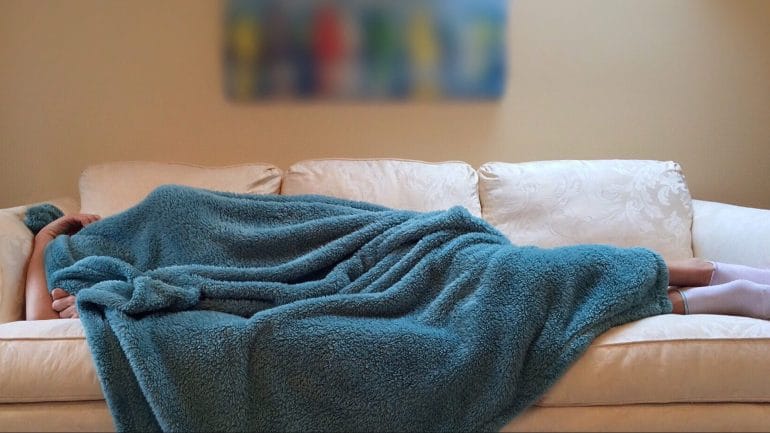36 Alarming Snoring Statistics and Facts for 2024
written by / January 9, 2022
Snoring statistics show that this is a common sleep problem. About 45% of people snore at least sometimes and 25% of people snore regularly. In the US, about 37 million people are habitual snorers. However, there’s a big difference between genders. About 40% of men snore compared to 24% of women. Still, only about 59% of snorers say that they snore. Find out more interesting stats and facts about this annoying sleep issue.
The Most Surprising Snoring Statistics for 2024
- The average snorer snores between 50 and 65 decibels.
- Jenny Chapman from Britain was recorded for snoring at a decibel of 111.6
- 25% of people snore on a regular basis.
- 37 million American adults regularly snore.
- According to men snoring statistics, about 40% of men habitually snore, compared to 24% of women.
- Snoring is the third leading cause of divorce in the US.
- 56% of partners sleeping with a snorer claim that snoring has an adverse effect on their wellbeing.
- Consuming alcohol or other depressants can increase the risk of snoring.
- Habitual snorers have a five-time higher risk of heart disease than those who snore only occasionally.
- Daytime dysfunction is one of the most common adverse effects of snoring.
General Stats and Facts About Snoring

In this section, we will be looking at general facts and statistics about snoring. For example, how loud does the average snorer snore?
1. Snoring can happen during any stage of sleep.
(Sleep Education)
Snoring occurs during sleep when your soft palate and uvula vibrate while you’re breathing in, producing harsh snoring sounds. There’s no rule about which stage of sleep you’ll start snoring.
2. The average snorer snores between 50 and 65 decibels.
(Herman Ostrow School of Dentistry of USC)
Of course, snoring could be lower or much higher than this. 50 to 65 decibels is as loud as a general conversation, a typewriter, or even a sewing machine. Snoring can go to higher decibels of around 90, which sounds like tools at work, a lawnmower, or trucks in traffic.
3. Jenny Chapman from Britain was recorded for snoring at a decibel of 111.6
(Daily Mail)
This is louder than a jet plane flying low to the ground. The woman was 60 years old when this was recorded in 2009. Her husband claimed that it was difficult to sleep next to his wife because of the loudness of her snoring.
4. Stop Snoring Day is March 24.
(American Sleep Association)
The American Sleep Association introduced the annual Stop Snoring Day to raise awareness about this sleep problem and the related sleep disorders that might have severe health consequences. March 24 has become devoted to snoring.
What Is the Percentage of People Who Snore?
Here, we will be looking at who snores, how many people snore, and how frequently they snore. We’ll also talk about the differences in snoring between specific demographics.
5. Almost half of adults snore at some point in their lives.
(The Canadian Society of Otolaryngology – Head and Neck Surgery)
According to some stats, 45% of people snore at least sometimes. This fact clearly indicates how widespread this sleep problem is.
6. 25% of people snore on a regular basis.
(The Canadian Society of Otolaryngology – Head and Neck Surgery)
Considering that one in four adults will be a habitual snorer, this problem definitely deserves greater attention. Besides affecting the sleeper’s sleep pattern and depriving them of proper rest, snoring can be associated with sleep apnea, a serious sleep disorder.
7. About 90 million Americans snore at least occasionally.
(National Sleep Foundation)
According to snoring stats, both men and women get affected by this sleep problem. Also, snorers can be found in all age groups.
8. 37 million American adults regularly snore.
(National Sleep Foundation)
Some people snore only occasionally—for example, when they catch a cold. However, a huge number of adults snore almost every night.
9. 37% of adult Americans snore a few nights a week or even more frequently.
(National Sleep Foundation)
Respondents in the National Sleep Foundation’s poll were asked how often they snore. According to adult snoring statistics, in addition to the 37% who snore at least a few nights a week, 27% of adults snore every night or almost every night.
10. About 40% of men habitually snore, compared to 24% of women.
(Sleep Education)
When it comes to snoring, there’s a great difference between genders. Women are less likely to snore than men. Males were more likely than females to report snoring at least a few nights a week.
11. Women who snore are usually shorter and heavier than those who don’t.
(Sleep Disorders Guide)
This piece of information is in line with the fact that overweight people are more likely to snore.
12. Women are more likely to snore during pregnancy.
(The Snoring Mouthpiece Review)
So what causes snoring in females during pregnancy? The two major reasons pregnant women tend to snore are nasal congestion and weight gain. Although snoring during pregnancy is generally harmless, it can be associated with gestational diabetes, high blood pressure, and sleep apnea.
13. 59% of snorers claim that they snore.
(Sleep Disorders Guide)
It’s interesting how many people don’t realize they snore. Although their partners complain about the nocturnal noises, a lot of snorers aren’t aware of their problem.
Snoring and Relationships

How does snoring affect relationships according to statistics? Here, we will be looking at snoring and how it works in relationships.
14. Snoring is the third leading cause of divorce in the US.
(Dream Sleep Respiratory)
According to snoring divorce statistics, the two major leading causes of divorce, infidelity and financial issues, are followed by this sleep problem. This shouldn’t surprise you if you know that most couples end up sleeping in separate rooms because of snoring. Obviously, this rattling noise is a great nuisance, which is proven in some UK studies: 80%–90% of people sleeping with a snorer have trouble achieving REM sleep.
15. Women whose partners snore are more likely to have insomnia.
(National Center for Biotechnology Information)
Women sleeping with snoring partners are three times as likely to have insomnia symptoms than those whose partners don’t snore. So trying some snoring home remedies, such as sleeping on your side or using nasal strips, may positively affect your marriage.
16. 2 out of 3 adults claim that their partner snores.
(Houston Sinus & Allergy, Dream Sleep Respiratory)
It’s shocking how much this common sleep habit can affect a relationship. According to some studies, a high percentage of couples argue because of snoring.
17. 56% of partners sleeping with a snorer claim that snoring has an adverse effect on their wellbeing.
(The Snoring Mouthpiece Review)
These kinds of snoring stats come from a survey conducted by the Australian Sleep Health Foundation. According to their findings, 40% of respondents complained that their snoring partners affected their mood. Also, 23% of them said that mating possums produce less annoying sounds than their partners.
Snoring and Age
Do people snore more or less as they age? Do children snore? Here, we will look at snoring according to age.
18. 30% of people aged 30+ are regular snorers.
(Houston Sinus & Allergy)
This sleep problem gets more common with age, which is confirmed by the fact that 40% of middle-aged people snore.
19. Men aged 70 or older are less likely to snore.
(Sleep Education)
If you’re wondering—“Does snoring get worse with age?”—Here is your answer. It’s interesting that men are more likely to snore as they get older, but after the age of 70, they become less likely to have this problem. Maybe snorers experience more health issues due to snoring, so maybe they don’t as easily reach old age. However, there’s no scientific evidence for this claim.
20. About 1 in 3 older adults will snore at least a few nights a week.
(National Sleep Foundation)
This was revealed by the National Sleep Foundation’s poll, which surveyed adults aged 55–84.
21. About 10% of children snore.
(The Snoring Mouthpiece Review)
Although snoring is often a sign of sleep apnea, not all children who snore have this sleep disorder. Some of the common snoring causes in children are respiratory infections and allergies.
22. 5.6% of children are habitual snorers.
(Sleep Disorders Guide)
If a child snores on a regular basis, the parents should pay attention to other symptoms of sleep apnea, such as pauses in breathing, snorts, and restless sleep. It’s always best to consult a doctor or sleep specialist in these cases.
23. 30% of college students snore.
(National Center for Biotechnology Information)
According to a survey carried out at a California university, men are more likely to snore than women, which is in line with other snoring statistics from the United States. The same study found out that Asian students are the most likely to snore.
Common Causes of Snoring
What causes snoring in females and males? Do people snore for different reasons? In this section, we will look at the reasons people snore.
24. 70% of snorers claim that this problem runs in their families.
(The Snoring Mouthpiece Review)
Snoring can be caused by both lifestyle and genetic factors. Some of the things that people can inherit related to snoring are enlarged tonsils, large adenoids, a long soft palate, and a long uvula.
25. Overweight people are more likely to snore.
(The Snoring Mouthpiece Review)
People with excess weight are more likely to have bulky throat tissue, which leads to snoring. That’s why one of the snoring remedies that work is losing excess weight.
26. People are more likely to snore when sleeping on their back.
(Sleep Education)
Due to gravity, the tongue and soft palate can more easily fall to the back of the throat in this position and thus partially close the airway. In order to prevent snoring, it’s best to sleep on the side.
27. Consuming alcohol or other depressants can increase the risk of snoring.
(Sleep Education)
Alcohol and other depressants relax the throat muscles, so they can easily collapse and close the airway. That’s why before any medical treatment for snoring, doctors advise their patients to avoid taking these psychoactive substances.
28. Having a cold or an allergy makes people more prone to snoring.
(Sleep Education)
Both colds and allergies can cause nasal congestion, which leads to airway obstruction and snoring.
Negative Effects of Snoring

What damage can snoring do to a person? Here, will look at the damaging effects of snoring and how it can affect someone’s life.
29. Daytime dysfunction is one of the most common adverse effects of snoring.
(National Sleep Foundation)
Many snorers experience daytime sleepiness, so they are often unable to concentrate or think clearly while they’re awake.
30. Habitual snorers have a 5 times higher risk of heart disease than those who snore only occasionally.
(The Snoring Mouthpiece Review)
According to additional stats about snoring, people who habitually snore are also at greater risk of developing hypertension, having a stroke, developing type 2 diabetes, and having high cholesterol.
Snoring and Sleep Apnea
Sleep apnea is a serious sleep condition that causes snoring. Here, we look at the correlation between snoring and sleep apnea.
31. About 50% of people who snore loudly have obstructive sleep apnea.
(National Sleep Foundation)
Snoring is one of the symptoms of this sleep disorder. However, not all people who snore necessarily suffer from obstructive sleep apnea.
32. Around 73% of habitual snorers may suffer from sleep apnea.
(Advanced Dental Sleep Treatment Center)
According to sleep apnea and snoring stats, this is the most likely percentage. However, there are many different studies that have different results. Before going to see a doctor, people who regularly snore should look for other sleep apnea symptoms, such as snorting, choking sounds, and daytime sleepiness.
33. 70%–95% of people with obstructive sleep apnea regularly snore.
(National Center for Biotechnology Information)
As you can see, snoring is the most common symptom of this sleep disorder. However, this symptom isn’t enough to make an accurate diagnosis since many people snore even though they don’t have obstructive sleep apnea.
Snoring Treatment
What can you do about it if you snore? Are there treatments available that can help? Here, we will explore different ways to stop snoring.
34. Almost 95% of patients using a mandibular advancement device say they snore less.
(National Center for Biotechnology Information)
A mandibular advancement device (MAD) is usually used when the tongue blocks the airway.
35. Surgery is successful in 70% to 95% of snoring cases.
(JAMA Network)
There are several surgical procedures used for treating snoring. They’re often used when other treatments don’t give any results.
36. 70% of people claim that a MAD helped their bedmates.
(National Center for Biotechnology Information)
Treating snoring improves the sleep quality of both the snorer and their partner.
Conclusion
As you can see from these snoring statistics, this sleep problem is more prevalent than you can imagine. Not only does snoring prevent snorers and their partners from getting proper rest, but it’s also associated with severe health issues. Therefore, it’s of immense importance to raise public awareness about this common nocturnal habit.








